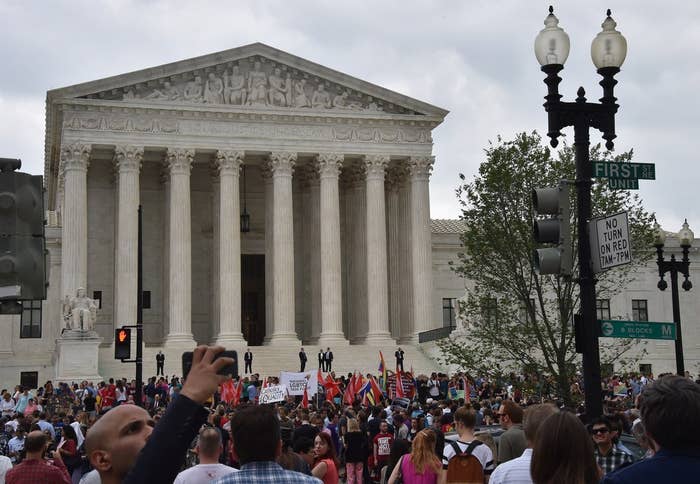
WASHINGTON — The Supreme Court may not ultimately decide whether its ruling in 2012 that ended automatic sentences of life without parole for juveniles applies retroactively to cases fully decided before the ruling was issued.
When the Supreme Court agreed to hear Henry Montgomery's case — which raises the question of whether its 2012 ruling in Miller v. Alabama applies retroactively to his case, decided in the 1960s — the justices also asked the parties to respond to a question about whether the court even had authority to hear the case, which is an appeal from the Supreme Court of Louisiana.
All parties believe the court has the authority to hear it, so the court appointed a lawyer, Richard Bernstein, to argue against the court having jurisdiction. On Tuesday morning, his 15 minutes leading off the arguments ended up taking over a significant, if not majority, of the court's 75 minutes set aside for the consideration of the case.
Louisiana courts had decided to apply a federal rule — detailed in another earlier Supreme Court decision in Teague v. Lane — when deciding whether the Miller ruling applied retroactively to Montgomery, which, if so, would mean he now, after more than 40 years in prison, needs to be re-sentenced.
Generally speaking, under Teague, if a criminal law ruling is substantive, it applies retroactively; if procedural, it does not.
When it considered the issue, Louisiana's Supreme Court decided that the Miller ruling was a procedural one, which, under Teague, meant Miller did not apply retroactively to Montgomery and he would not have the chance to be re-sentenced.
On Tuesday in Washington, the debate turned on whether the Louisiana court's decision meant that it had actually issued a ruling about federal law or if it merely had applied federal court cases when making its own determination, under its state Constitution, of whether Louisiana courts should give Miller retroactive effect.
If it was a decision about state law, generally the Supreme Court would not have jurisdiction to hear the case. If the court could not hear the case from the Louisiana Supreme Court, it was noted repeatedly, Montgomery could still bring a federal court challenge to Louisiana's decision not to apply Miller retroactively to him.
Even if it was a decision about state law, however, that doesn't necessarily settle the matter, some justices suggested. If the state decided to "self-commit" to following the U.S. Supreme Court's Teague ruling, as Justice Elena Kagan said happened here, is that enough to create the federal court jurisdiction needed for the U.S. Supreme Court to review the case?
When Kagan asked that question of Montgomery's lawyer, Mark Plaisance, he said that he agreed that would be sufficient to create jurisdiction. Others like Justice Antonin Scalia, however, questioned whether that would potentially create an advisory opinion, which the U.S. Supreme Court cannot issue, since the Louisiana Supreme Court could get the U.S. Supreme Court's decision and then say, as Scalia put it, "Now that we see what they say, we choose not to follow Teague."
Going back and forth with Plaisance, Scalia noted that, if the Louisiana Supreme Court later decided not to follow the U.S. Supreme Court's analysis on retroactivity, "Wouldn't that make us look foolish?"
When Deputy Solicitor General Michael Dreeben got up, he noted a federalism argument for why the Louisiana Supreme Court's ruling should be seen as a federal one, justifying the court taking jurisdiction of the case. He explained the Louisiana Supreme Court decision to follow Teague could be seen as a decision made because it knows that the federal courts — under habeas corpus claims — eventually would use Teague to decide whether Miller should apply retroactively. As such, applying Teague to its state rules on retroactivity, Dreeben reasoned, allows a state to get the "first crack" at addressing the issue — before having federal courts do so on habeas corpus grounds.
While the outcome of the debate on the Supreme Court's jurisdiction over the Louisiana Supreme Court decision was not clear, the debate on the primary question of whether Miller should be given retroactive effect was similarly unresolved Tuesday.
The state argued that the decision was a procedural one because only a "categorical bar" on a punishment — meaning if the court barred all juvenile life without parole sentences and not just automatic ones — can be seen as a substantive ruling. Montgomery and the Obama administration argued, as Dreeben put it, that the ruling had to be seen as a substantive one because Miller "compelled states to adopt new sentencing options." There was no obvious alignment of a majority of the justices on either point.
Justice Anthony Kennedy, whose vote could prove to be the key one on both issues, spoke up only a few times during the argument, signaling some discomfort with the position that the court lacked jurisdiction in the case but not betraying any real clues as to his position on the retroactivity question itself.
